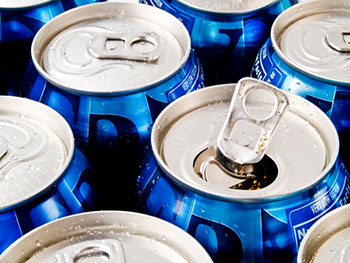More Health and Nutrition Bites
Related
Are you sabotaging yourself with your choice of beverage?
It's clear that sugary sodas are bad for you: the calories they contain come from nothing but an appalling amount of sugar (about 10 teaspoons per can), and unlike foods with the same number of calories, evidence suggests that their liquid form leads your body to treat those calories as not nearly as satisfying as the same number of calories in a form that requires chewing, making those who drink more sugar-sweetened sodas at a greater risk of weight gain.
Beverages vs. food: the source of sugar matters
We know that sugar-sweetened beverages contribute to higher blood pressures, poor cholesterol scores, and chronic diseases such as diabetes and gout, and you probably are well aware of various public health initiatives aimed at getting people to reduce their consumption, from taxing the beverages themselves to limiting the size of the beverage you can purchase.
What The American Beverage Association wants you to think
When I am asked to speak or give an interview about health, diet, and nutrition, I am very careful to make it clear that I am an evidence-based physician. In the last thirty-plus years there has been an explosion of high quality research into diet and nutrition, and when I say "high quality research" I mean that it is well-designed, of an appropriate size, funded by disinterested parties, and published in a reputable, peer-reviewed medical journal.
Health & Nutrition Bites
Get the latest health and diet news - along with what you can do about it - sent to your Inbox once a week. Get Dr. Gourmet's Health and Nutrition Bites sent to you via email. Sign up now!
Taxing sugary drinks cuts purchases

It's clear that those who drink more sugar-sweetened beverages have higher body weight, and often that also means higher levels of body fat and greater waist circumference. All three (higher body weight, body fat, and waist circumference) are associated with greater risk of diabetes, heart disease, and other chronic conditions, including cancers.
Inducing people to cut their intake of sugar-sweetened beverages would seem to be an obvious strategy to help improve public health. Cigarette smoking is an obvious parallel: we have decades of research showing that increasing taxes on cigarettes has contributed to smokers either cutting their intake or quitting altogether.
Yet "obvious parallels" are not "peer-reviewed data", so a team of researchers from the University of Pennsylvania and Johns Hopkins University set out to assess the impact of a tax on sugar-sweetened and artificially-sweetened beverages in Philadelphia, Pennsylvania that took effect in January, 2017 (JAMA 2019;321(18):1799-1810).
The authors assessed the sales of sugar-sweetened and artificially-sweetened beverages in Philadelphia both before and after the tax took effect and compared those sales to those in the same time period in Baltimore, Maryland - a city with a similar sociodemographic and health profile but without a beverage tax. Further, the authors looked at the changes in purchasing patterns in the zip codes bordering Philadelphia that were not subject to the tax.
A company known as Information Resources Inc. obtains sales data from major US retailers and sells it to third parties. The authors purchased the relevant data from this company for the period covering January 1, 2014 through December 31, 2017. This data included store sales of specific beverages in total volume per store for 4-week periods during that time frame and did not identify purchases made by individuals.
The authors classified the types of stores selling sugar-sweetened and artificially-sweetened beverages broadly, into supermarkets, mass merchandise stores, and pharmacies. From their analysis they excluded stores that opened after January 1, 2014, closed before December 31, 2017, or closed and then reopened at any point in between the two dates. They then chose to include only the years 2016 and 2017 as those dates had the strongest sales volume parallels for Philadelphia and Baltimore. This left them with 291 stores: 54 supermarkets, 20 mass merchandise stores, and 217 pharmacies.
They found that the price increase of the affected beverages were largely passed along to the consumer: the average price of such beverages sold in supermarkets in Philadelphia increased from 5.43 cents per ounce to 6.24 cents per ounce, while in Baltimore the same beverages in the same types of locations increased from 5.33 cents to 5.50 cents per ounce. Increases were not as high in mass merchandise stores, but were significantly higher (from 6.60 cents per ounce to 8.28 cents per ounce) in pharmacies.
So did that affect how much/many taxed beverages people bought? Well, yes and no.
Yes: the total volume of sales of the taxed beverages dropped by 51% in Philadelphia, while in Baltimore (without a tax on such beverages), sales dropped only 2.3% in the same time period.
No (sort of): sales of the beverages that were taxed in Philadelphia jumped 43.2% in those zip codes bordering Philadelphia - suggesting that at least some people simply went to buy their sugar-sweetened and artificially-sweetened drinks where they weren't taxed.
Even when taking those sales in bordering zip codes into account, however, the authors calculated that purchases of the taxed beverages still dropped by 38% in Philadelphia.
What this means for you
There is no single strategy that will solve what is known as "the obesity crisis": it's a problem with multiple causes that will require a multi-pronged solution, just like the problem of cigarette smoking. Taxing sugar-sweetened and artificially-sweetened beverages appears to be a reasonable step toward reducing their consumption.
First posted: May 15, 2019
